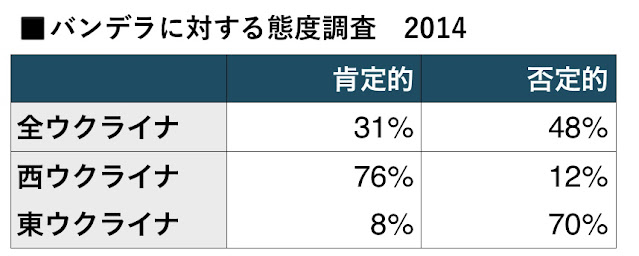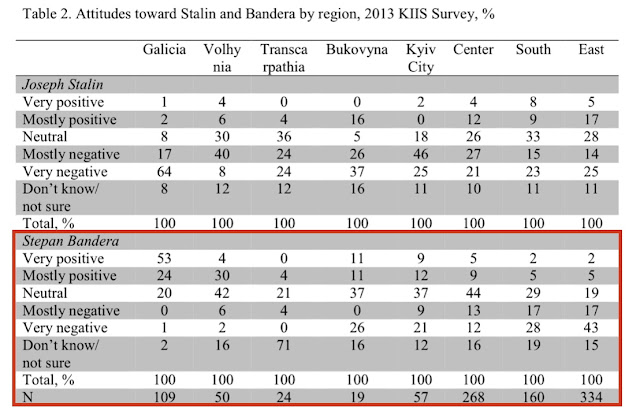 |
| Zelensky defends Nazi collaborator Stephan Bandera. |
前にも示したが、ウクライナ国家の英雄かつナチ協力者ステパン・バンデラ(1909-1959年)を支持するウクライナ人の割合を表にすれば次のようになる。
|
In a poll entitled “Nostalgia for the USSR and Attitude to Individual Figures” taken only months after the Maidan revolution in 2014, almost half of all Ukrainian citizens reported having a negative attitude towards Bandera (48%), while only 31% had a positive one. This gap in public opinion grows wider when divided along geographic lines: 76% of Western Ukrainians have a positive attitude towards him, compared with only 8% in the East (the negative attitudes are 12% and 70% respectively).6 Based on these numbers, the myth of Bandera, contrary to the stated goals of its propagators, is doing far more to accentuate the divide between East and West Ukrainians than to bridge it.[...] |
|
Perhaps the question of whether Stepan Bandera was either a Nazi collaborator or a national hero can be answered simply: he was both. That is, historically he and his forces had more of a connection with the National Socialists and their endeavors in creating a new order in Europe than men like Volodymyr Viatrovych would have you believe. But simultaneously, although he is absolutely still seen as a Ukrainian Hitler in Russia and much of Eastern Ukraine, (Bandera: (Re)Building Ukrainian National History Bandera: Aaron R. Wolf, January 2020 ) |
これは2014年のユーロマイダン革命直後の調査とあるが、2013年にも調査がされているようだ。
|
Favorable attitudes toward Bandera are also stronger in Volhynia (34%), Bukovyna (22%), and Kyiv City (21%) than in the Central (14%), Southern (7%), and Eastern Ukraine (7%). Only 4% of Transcarpathian residents express positive views of the OUN-B leader. The same percentage of the respondents in this region of historically Western Ukraine have negative views of Bandera. The very and mostly negative attitudes toward the OUN leader are much stronger in the Center (25%), Kyiv (30%), the South (45%), and the East (50%) (Table 2). (Stalin and Bandera: Politics of Totalitarian Leaders in Contemporary Ukraine, Ivan Katchanovski, Conference Paper · November 2013) |
|
|
統計調査の仕方がどのようになっているかは不詳だが、マイダン革命以後にバンデラ支持がいっそう高まったということは言えるだろう。とはいえやっぱり問題は西ウクライナと東ウクライナの支持の相違だな。
ウクライナのネオナチ問題は既に2013年にもIMFの会議で問題にされていたそうだが[参照]、最近、朝日の論座にも「ウクライナには「ネオナチ」という象がいる」(晴義明、2022年03月23日)という記事があり、そこには新しい「イスラム国(IS)になる可能性だって示唆されていた。これは読んだ当時は「いくらなんでも」と思ったが、この数日、充分にありうる気がしてきたね
仮にウクライナがロシアに奇跡的に勝利してしまったら、まず手始めにウクライナ内の親ロシア派住民の「皆殺し」が始まる可能性は大いにありうるよ。


